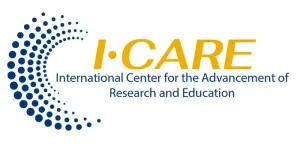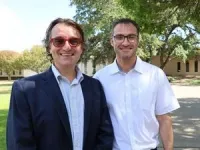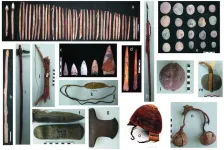(Press-News.org) SAN ANTONIO (Sept. 20, 2023) – Capitalizing on the power of its longstanding international partnership portfolio, Texas Biomedical Research Institute (Texas Biomed) has created a new global center to foster collaborations in infectious disease research.
The International Center for the Advancement of Research & Education (I·CARE) leverages the power of global exchange to solve complex health issues in an increasingly connected world. Texas Biomed currently maintains a portfolio of more than 15 international partnerships across Latin America, Africa, Asia and Europe. These partnerships are driving research in tuberculosis (TB), malaria, Ebola and more. I·CARE will strengthen these existing collaborations and grow partnerships worldwide.
The center’s mission is to identify, facilitate and strengthen national and international partnerships to improve human, animal and environmental health through Texas Biomed’s expertise in laboratory-based science and the expertise onsite at its global partner locations.
Trainees, researchers and lab personnel are able to learn from one another and gain real-world experience through training and research exchanges – whether in a lab in San Antonio, a community health center in the Rio Grande Valley or a clinic in the Democratic Republic of Congo.
“I·CARE aims to listen and learn from our global partners, while simultaneously sharing its member’s assets and knowledge,” says the new I·CARE Director and Texas Biomed Professor Jordi B. Torrelles, PhD. “I•CARE will capitalize on the power of Texas Biomed’s longstanding international partnership portfolio, while also focusing on cultivating more collaborations, creating a global hub for the advancement of infectious disease research and granting opportunities for educational exchange.”
This unique global center creates a robust infrastructure for two-way educational efforts, serving as a tool for next generation scientists. Texas Biomed has significant strength in infectious diseases of global impact including pathogens causing AIDS, hepatitis, hemorrhagic fever and influenza, as well as those causing TB and parasitic diseases responsible for malaria and schistosomiasis.
“I•CARE enables researchers to apply their discoveries in the laboratory to human- and animal-based studies outside the lab and collaborate in the development of new applied research projects and clinical trials in real world settings,” Juan Ignacio Garcia, PhD, I•Care Operations Coordinator, explains.
Understanding what works in communities in a way that increases the effectiveness of their discoveries is critical for laboratory-based scientists. Additionally, scientists working with patients or operating in environments in need of critical equipment and expertise will benefit from the lab-based training and resources I•CARE can provide.
“New diagnostics and therapies only work if people use them and they are cost effective,” explains Texas Biomed Executive Vice President for Research and Professor Joanne Turner, PhD. “Lab-based scientists benefit from understanding the environmental, social and political landscapes of the people and places where these solutions will be deployed. And, researchers working directly with patients benefit from access and understanding of the science that goes into lab-based discoveries.”
Learn more about (I·CARE) here and ways to get involved.
###
About Texas Biomed
Texas Biomed is one of the world’s leading independent biomedical research institutions dedicated to eradicating infection and advancing health worldwide through innovative biomedical research. Texas Biomed partners with researchers and institutions around the world to develop vaccines and therapeutics against viral pathogens causing AIDS, hepatitis, hemorrhagic fever, tuberculosis and parasitic diseases responsible for malaria and schistosomiasis disease. The Institute has programs in host-pathogen interaction, disease intervention and prevention and population health to understand the links between infectious diseases and other diseases such as aging, cardiovascular disease, diabetes and obesity. For more information on Texas Biomed, go to www.TxBiomed.org.
END
72% of cetacean and pinniped stocks managed under US jurisdiction are highly or very highly vulnerable to climate change, according to a study published in PLOS ONE led by Matthew D. Lettrich at NOAA Fisheries, in Silver Spring, Maryland, United States of America.
Climate change could affect the distribution, behavior, and movements of marine mammals via warming ocean temperatures, rising sea levels, decreasing dissolved oxygen, declining sea ice coverage, ocean acidification, and salinity changes. Climate vulnerability assessments (CVAs) provide a framework for evaluating climate impacts over a broad range of species. Prior to the study, no known CVAs specifically assessed US-managed ...
Caves served as sites for burial and later modification of human remains for thousands of years in the Iberian Peninsula, according to a study published September 20, 2023 in the open-access journal PLOS ONE by Zita Laffranchi and Marco Milella of the University of Bern, Switzerland, and Rafael Martinez Sanchez, Universidad de Córdoba, Spain, and colleagues.
The use of caves as burial sites is a cultural phenomenon with a broad distribution in both space and time. In the southern Iberian Peninsula, this practice became particularly ...
Interpersonal violence was a consistent part of life in ancient hunter-gatherer communities on the Atacama Desert coast of northern Chile, according to a study published September 20, 2023 in the open-access journal PLOS ONE by Vivien Standen of the University of Tarapacá, Chile and colleagues.
Archaeological research supports the notion that interpersonal violence and warfare have played an important role in the lives of hunter-gatherer groups over time, but many questions remain about the factors that influence such violence. The record of ...
The first comprehensive analysis of the relationship between campaign donations and the issues legislators prioritize with congressional speech is published in the open access journal PLOS ONE this week. While prior research reaches mixed conclusions on associations between political donations in the US and voting patterns of legislators, this research suggests there are substantial associations between donations and policy priorities expressed in congressional speeches, and marks language use as an interesting and viable arena for looking at the impact political donors may have on congressional behavior.
Publicly traded corporations and labor unions in the US routinely raise funds ...
Job ads which use masculine rather than gender-inclusive language are perceived by women as sexist, leading them to feel ostracized, demotivated, and as though they don't belong at work
###
Article URL: https://journals.plos.org/plosone/article?id=10.1371/journal.pone.0290709
Article Title: The impact of gender-exclusive language on women’s anticipated ostracism: A preregistered replication of Stout and Dasgupta (2011)
Author Countries: USA
Funding: Miami University Committee on Faculty Research, Heather M. Claypool Miami University College of Arts and Science, Heather M. Claypool. END ...
Only 1% of US kids who are obese in elementary school transition to a healthy weight within two years, although 1 in 4 overweight children progress to a healthy weight range
###
Article URL: https://journals.plos.org/plosone/article?id=10.1371/journal.pone.0290565
Article Title: Weight trajectories and obesity remission among school-aged children
Author Countries: USA
Funding: Research reported in this publication was supported by the National Institute of Diabetes And Digestive And Kidney Diseases of the National Institutes of ...
The commonly-held belief that attempting to suppress negative thoughts is bad for our mental health could be wrong, a new study from scientists at the University of Cambridge suggests.
Researchers at the Medical Research Council (MRC) Cognition and Brain Sciences Unit trained 120 volunteers worldwide to suppress thoughts about negative events that worried them, and found that not only did these become less vivid, but that the participants’ mental health also improved.
“We’re all familiar with the Freudian idea that if we suppress our feelings or thoughts, then these thoughts remain in our unconscious, influencing our behaviour and wellbeing ...
The Amazon river basin is known for its immense and lush tropical forests, so one might assume that the Amazon’s land is equally rich. In fact, the soils underlying the forested vegetation, particularly in the hilly uplands, are surprisingly infertile. Much of the Amazon’s soil is acidic and low in nutrients, making it notoriously difficult to farm.
But over the years, archaeologists have dug up mysteriously black and fertile patches of ancient soils in hundreds of sites across the Amazon. This “dark earth” has been found in and around human settlements dating ...
HOUSTON ― The University of Texas MD Anderson Cancer Center today broke ground on a 600,000-square-foot facility intended to anchor the institution’s expansive south campus research park. The building was purposefully built to enable collaborative science and impactful breakthrough discoveries that will accelerate efforts to end cancer.
A $668 million institutional investment will support the construction of MD Anderson’s South Campus Research Building 5 (SCRB5), a 7-story building designed by Elkus Manfredi Architects with state-of-the-art research facilities and inspiring public spaces to facilitate exceptional science. ...
Researchers from Ann & Robert H. Lurie Children’s Hospital of Chicago and colleagues reported for the first time that a genetic biomarker may be able to help predict the severity of food allergy reactions. Currently there is no reliable or readily available clinical biomarker that accurately distinguishes patients with food allergies who are at risk for severe life-threatening reactions versus more mild symptoms. Findings were published in the Journal of Allergy and Clinical Immunology.
Dr. Lang and colleagues found that the presence of an enzyme isoform called α-tryptase, ...









